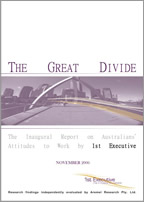Australians' Attitudes To Work
Wednesday, February 14, 2007
Flexible Work Initiatives Fail to Provide Life Balance
We recently posted this article on our website www.1stexecutive.biz , and would love to hear of your opinions surrounding the issue of work flexibility being used to increase work demands, rather than providing the healthy balance between work and life.
Australian employees, both permanent and casualised, are currently working more hours each year than workers in any other country in the industrial world, leaving many employees stressed, over worked, and physically ill. This is costing the Australian economy well over $200 billion annually in Workers Compensation for stress claims.
This highlights only the beginnings of the impact our labour shortage is having on our employable population, set to dramatically increase until 2012. Andrew Thoseby, Director of 1st Executive has said "this is a direct symptom of our worsening labou shortages. As Baby oomers down-shift, Generation Y demand flexibility, and more of our older population retire, we are left with an increasing hole in our workforce. Employers have responded to these factors with a casualised workforce, promoting work life balance and flexible hours. However, losse parameters around these initiatives often lead to expectations of being on call 24/7, addecting mental and physical health, as well as family stability."
Employers need to define their work requirements from the top, and identify how those requirements can be achieved without placing unrealistic expectations on their staff. "Bottom line, it will conutnue being a candidate driven market for at least the next 35 years. Employees have clearly indicated in our research that they will leave for another employer that offers greater work life balance initiatives; employers need to understand the implications of losing their best talent due to unrealistic work demands", Thoseby continued.
John Howard has recently been quoted "there is no greater mark of economic success than low unemployment." Whilst this has some validity, an increasing amount of employees are voluntarily leaving their employer for better working conditions. This costs each employer at least $150,000 every time one employee leaves. Add to ths the billions in compensation claims for stress in all the businesses facing this crisis, and our economical success in in serious question.
"Work life balance and flexible hours are excellent initiatves to attract and retain key talent. However employers need to identify and define the parameters of these initiatives so that unrealistic work demands aren't placed on employees as a result of work flexibility, and to ensure they retain their key talent", Mr. Thoseby concluded.
So what are your thoughts? Have you ever been in a situation where you were promised life balance through flexible work arrangements, yet received higher work demands?
Australian employees, both permanent and casualised, are currently working more hours each year than workers in any other country in the industrial world, leaving many employees stressed, over worked, and physically ill. This is costing the Australian economy well over $200 billion annually in Workers Compensation for stress claims.
This highlights only the beginnings of the impact our labour shortage is having on our employable population, set to dramatically increase until 2012. Andrew Thoseby, Director of 1st Executive has said "this is a direct symptom of our worsening labou shortages. As Baby oomers down-shift, Generation Y demand flexibility, and more of our older population retire, we are left with an increasing hole in our workforce. Employers have responded to these factors with a casualised workforce, promoting work life balance and flexible hours. However, losse parameters around these initiatives often lead to expectations of being on call 24/7, addecting mental and physical health, as well as family stability."
Employers need to define their work requirements from the top, and identify how those requirements can be achieved without placing unrealistic expectations on their staff. "Bottom line, it will conutnue being a candidate driven market for at least the next 35 years. Employees have clearly indicated in our research that they will leave for another employer that offers greater work life balance initiatives; employers need to understand the implications of losing their best talent due to unrealistic work demands", Thoseby continued.
John Howard has recently been quoted "there is no greater mark of economic success than low unemployment." Whilst this has some validity, an increasing amount of employees are voluntarily leaving their employer for better working conditions. This costs each employer at least $150,000 every time one employee leaves. Add to ths the billions in compensation claims for stress in all the businesses facing this crisis, and our economical success in in serious question.
"Work life balance and flexible hours are excellent initiatves to attract and retain key talent. However employers need to identify and define the parameters of these initiatives so that unrealistic work demands aren't placed on employees as a result of work flexibility, and to ensure they retain their key talent", Mr. Thoseby concluded.
So what are your thoughts? Have you ever been in a situation where you were promised life balance through flexible work arrangements, yet received higher work demands?
Monday, November 06, 2006
The Great Divide: Australians' Attitudes To Work

The Inaugural 1st Executive report, "The Great Divide: Australians' Attitudes To Work" reveals the great divide between employers and employees. If you have read the report or have opinions on this topic we would like to hear your comments.
Feel free to post a comment and to the debate. Australian employers face a potential crisis if they don't engage their workforce!